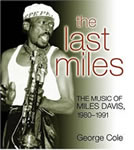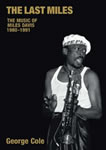Guitarist Steve “Luke” Lukather is best known as the guitarist in the rock band Toto, but he’s also been a much in-demand session musician, playing with artists such as Michael Jackson (Steve plays the driving riff on “Beat It”), Boz Scaggs, Don Henley and Lionel Ritchie.
Steve also has a Miles connection, as around late 1985, Miles recorded a tune he had written with fellow Toto member David Paich, called “Don’t Stop Me Now.” The song is an instrumental ballad with a gorgeous melody and can be found on the Toto album Fahrenheit. Miles also played it live and you’ll find it on the CD Munich Concert and DVD Live in Munich, plus The Complete Miles Davis in Montreux boxed set.
TheLastMiles.com talked to Steve about the origins of the tune, how Miles got to record it and the reaction to the song. Steve also talks about how Miles asked him to join his band – and why he reluctantly had to refuse the offer.
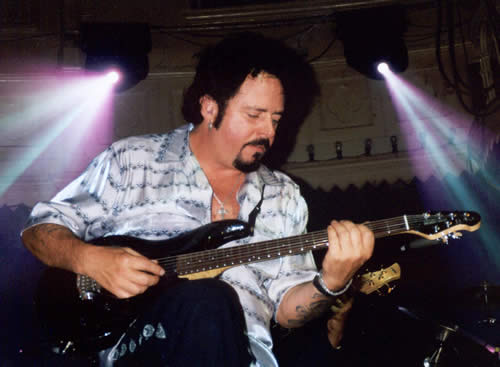
Steve Lukather Photo © and courtesy SteveLukather.net
TheLastMiles.com: What did Miles and the music of Miles Davis mean to you?
SL: I heard a lot of interesting things about Miles; that he really loved rock and roll guitar players and that he dug pop music. We all of think of Miles with such reverence, Four and More and all of that. Through the years I’ve worked with Herbie [Hancock], Wayne [Shorter], Tony Williams and Miles – I never thought I’d get to play with these guys. I listen to that music all the time – it’s what I put on in the car on the long journey home. It makes you feel good and it educates you every time you hear that stuff.
TLM: Can you explain the origins of “Don’t Stop Me Now?”
SL: Originally it was just something David started out with the original melody. He just had a little piece and I jumped in said: “That’s fucking gorgeous!” We were thinking of doing like a Jeff Beck Blow by Blow thing, where I would be the featured melody and soloist on it, because I came up with the bridge and the turnaround at the end. And then the whole Miles thing happened and we changed our whole attitude about it. We thought, “He’ll probably say no, but what the fuck – nothing ventured, nothing gained.” A vortex opened up and he allowed us to share the honour with one of the greatest legends of all time. Of all the rock and roll bands to do something with him. I don’t know why, I think he just liked our vibe. He was so nice to us; he was just the opposite of what we had heard.
[The Toto connection came about because Miles was recording a couple of tracks with Toto keyboardist Steve Porcaro, who also co-wrote “Human Nature”, a track Miles played live up until his last concerts. Miles was due to meet Steve Porcaro and producer Tommy LiPuma at David Paich’s home to do some initial work on the tunes – there’s more on this and the music they recorded in my book. Also waiting at the house was Steve Lukather, Toto drummer Jeff Porcaro (now sadly deceased), plus other members of Toto and the Porcaro family.]
TLM: Can you describe that first meeting with Miles?
SL: Miles was coming over to the house and we were all sitting there having a drink, because we just wanted to meet the guy. David had two grand pianos all set up in his living room. There’s a real funny story about when Miles came in. David used to have a stuffed life-sized German Shepard [dog] by the front door in attack mode! Miles walks in and the first thing he does when he sees the dog is jump back! And Dave goes “It’s okay Miles, the dog’s fake!” And Miles takes one look at us all in the room and then at the dog and says: “I’ve got some shit to make that dog come alive!” We just howled laughing! Then he came in and we introduced ourselves. He was very gracious because we’d heard stories that he could be pretty tough if he didn’t dig the vibe.
We tried to be as mellow and respectful as possible. He was just talking shit asking things like: “What are you guys doing?” We were walking on eggshells because we didn’t want to set the cat off. So we moved very slowly. He spent a couple of days hanging out with us and he got a chance to see that we had a sense of humour, we had respect, we had interests in lots of music and that we weren’t just a bunch of rock ‘n’ roll punks. Then we seized a window of opportunity.
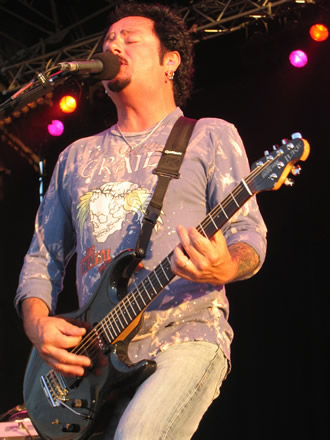
Steve Lukather Photo © and courtesy Arend Slagman
TLM: How did you ask Miles to play on the track?
SL: We explained we were making a record [Fahrenheit] and then said: “In fact, we’ve got a tune that we’d love you to play on.” And he looks at us like “yeah, alright, I hadn’t heard that one before!” Dave said: ‘It’s something like a Sketches of Spain vibe we’re looking at, but we don’t want to get in your face about it. Can we play the song for you one time?
I sit down at one piano and Dave sits down at another and we start playing “Don’t Stop Me Now.” I was playing the melody and at the end of it he looks over at us and says “What is this? Fucking Ferranti and Tycher? [a piano duo from the 1960s]” – we laughed our asses off! Then he said “Yeah I liked that, it’s a nice tune.” We didn’t think much of it and then he went to work with Steve and cut some tracks.
TLM: Describe the recording process.
SL: Miles wanted to cut the horn at Jeff’s studio [called The Villa] and we were all over there cutting the Fahrenheit record. So just in case, we cut the track and left the melody off – we just left open spaces. When Miles got there, we said “Hey man would you mind just playing the tune? Just blow on it and see what happens? If you don’t feel comfortable that’s cool.” We had the music, so we ran it down together with him and he was kind of playing around the melody – he wasn’t really playing the melody. So we figured, we’re not going to tell Miles Davis what to play, so we said, “Miles, we have a take of this, would you mind just giving it a listen and play whatever you want?” He says “Okay, I’ll play like that. You like that old shit right?” So he gets out the Harmon mute and he played it down – one take. We’re all stood there completely freaked out – it was unbelievable. At the end, the song just kind of fades out, but he just kept playing the blues. I was sitting there with chicken skin on my arms – it was unbelievable moment. And that’s how we ended the record – with just Miles blowing. Later on, [saxophonist] David Sanborn came down to play on a different tune on the record and he’d heard that we had cut a tune with Miles. He said: “I gotta hear it,” and so we played it and he flipped and said “Please just let me be on the track!” So he doubled the melody and played a couple of flurries. So we got Sanborn, Miles and us on one track – that was pretty cool.
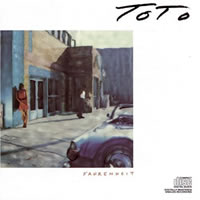
TLM: Any other memories of the session?
SL: Miles was an artist as well, and Jeff Porcaro was too. Jeff had this really bizarre picture – in fact I had it done as a tattoo on my arm after Jeff passed away – it’s just this weird character. Miles saw it and said “I love this, this is fantastic.” Jeff says: “Well, if we can use the jam on the record, please take it.” Miles says: “Stop the session – I’m going to draw you something.” So he sat down with Jeff’s art pad and coloured pencils and pens and made Jeff a drawing in the classic Miles style. And he gave it to him and said “you can have the track too”. The aura of this cat – he was the hippest looking cat you’ve ever seen. He was telling us stories about [drummer] Philly Joe [Jones] jumping out the window of a second storey building and breaking his leg because he didn’t have the money to check out. It was really deep.
TLM: What happened after the recording session?
SL: Word got around that Miles had done this with us, a bunch of white boys from The Valley and everybody was calling his office and asking Miles to play on their record!
TLM: And Miles asked you to join the band?
SL: I never thought he would actually listen to the record, but then I get a call from Tommy Lipuma saying “Miles has just called me and he wants me to call you, because he wants you to play in his band.” I go “What!?” I’m like: “Fuck me, you’re kidding!” Miles had obviously heard the record and I guess he liked my crazy rock and roll shit! So he calls me and says: “Hey man, you wanna play in my band?” I’m sitting on the phone freaking as I had to say no as we were leaving like in three days for a world tour. As much as a great honour and lesson it would have been for me in life and in music, I couldn’t let the guys down, so I had to say no. I said: “Look Miles, no one’s gonna believe that this ever happened, but I’m turning you down. [The band are] my brothers who I’ve been with since high school, I can’t just leave them in the lurch for a full tour. He said “I understand, that’s cool.” And that was the last time I ever spoke to him. But then Lipuma calls me back and says “Who should we get – have you got any suggestions?” I suggested he should call either Mike Landau or Robben Ford. Robben got the call and the gig [Ford played with Miles from April to July 1986].
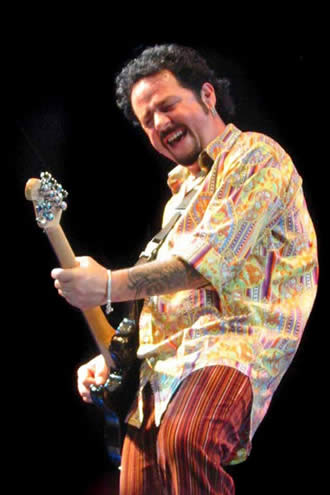
Steve Lukather Photo © and courtesy SteveLukather.net
TLM: What was the reaction like to “Don’t Stop Me Now”?
SL: It was never released as a single because it was such a strange song. It was like we were a rock band but jazz radio didn’t want to touch us, even though we had Miles. It was too jazz for any rock station. So it was like this cult kind of tune. People know it and they love it and we sometimes play it live and the crowd sings the melody, even though there are no words. We felt it would be disrespectful to draw out the fact that Miles Davis was on playing on our record and we promised not to do that, and so we just put a small credit on the record.
TLM: You also made it the last track on the album.
SL: After you hear Miles what’s going to come after that?
TLM: Miles played your song live.
SL: That was beyond – when I heard that he dug it so much that he played it live. I just got a CD [Munich Concert] with the song on it and my name is on a Miles Davis record – that’s a huge moment for me and for David too.
TLM: What are your views on the music Miles played in the 1980s?
SL: This is a purely subjective opinion. I never really knew the guy to call him a friend, but as a fan, my opinion is that he’d already done it all. He didn’t want to go back – he’d already re-defined music. He was there in the early days of bebop, then he went on to electric stuff, started a whole new music scene there and made so many musicians famous. He was just trying to what he liked. He did what he wanted to do, when he wanted to do it and just didn’t give a fuck. Nor should he – he was Miles Davis.
TLM: Finally, what are your thoughts on the guitarists Miles had in the 1980s, people like Mike Stern, John Scofield, Robben Ford and Foley?
SL: I’ve played with most of the guys. I don’t know Foley, but I’d like to meet him some time. He was an oddball – his whole take was four strings and that’s an original concept. He’s the guy who played on my tune [on the Munich CD/DVD]. I revere all these guys. I often wonder what it would have been like to have gone on the road and play with Miles. I probably would have grown as a musician and he would have made me a better player. But I’ve recorded with him and he recorded one of my songs, and as a composer, that’s the greatest honour there is. I will always cherish that memory.
Many thanks to Steve and Arend Slagman. Check out Steve’s website at www.stevelukather.net
